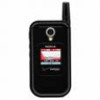Nokia 6215i Nokia 6215i User Guide in English - Page 25
Messaging - programming
 |
UPC - 009322976925
View all Nokia 6215i manuals
Add to My Manuals
Save this manual to your list of manuals |
Page 25 highlights
Messaging 5. Messaging If you have subscribed to a message network service, you can send and receive messages to and from compatible phones that also subscribe to a message service. You can also send and receive multimedia messages and e-mail. Messaging features are network services. Important: Exercise caution opening messages. Messages may contain malicious software or otherwise be harmful to your phone or PC. Note: When sending messages, your phone may display MESSAGE SENT. This is an indication that the message has been sent by your phone to the message center number programmed into your phone. This is not an indication that the message has been received at the intended destination. For messages that fail, the network will create a new error message, explaining why the message was not delivered. Contact Verizon for more details about messaging services. ■ TXT messaging When composing TXT messages (SMS) or enhanced messages (EMS, messages that can contain graphics, sounds or formatted text), the number of characters used (out of a maximum per message) appears in the top left corner of the message screen. Segments are created when the message length exceeds the maximum allowed number of characters. The number of segments used (out of a maximum of 7) appears in the top right corner of the message screen. No additional text can be entered when all segments and characters have been used. Segments are delivered as individual messages. The use of special characters takes up more space than standard characters. E-mail addresses are counted as characters. EMS messages cannot be sent to e-mail addresses. For information on entering text into messages, see "Text entry," p. 18. ■ PIX messaging PIX messages are multimedia (MMS) messages that contain text, sound files, or image files. Your phone supports PIX messages that are up to 125 KB. If the maximum size is exceeded, your phone may not be able to receive the message. Depending upon your network services, you may receive a message that includes an Internet address where you can go to view the PIX messages. 24















